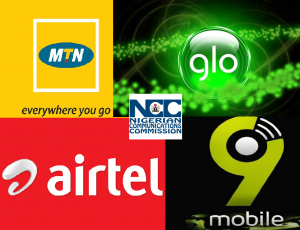Joy Agwunobi
Across Nigeria, a wave of discontent is rising as telecom operators propose a 100 per cent increase in tariffs for calls and data subscriptions. Many subscribers argue that operators should prioritise fixing network issues and improving service quality before considering any tariff hikes.
They highlighted problems such as poor service delivery, inconsistent network coverage, and rapid data depletion as major frustrations. For a country deeply reliant on mobile networks for communication and business, these concerns have sparked widespread debates on the fairness of paying more for low-level services.
The proposed tariff hike, currently under review by the Nigerian Communications Commission (NCC), is seen by Mobile Network Operators (MNOs) as a necessary response to mounting operational costs. According to the telecom companies, factors such as rising inflation and the persistent devaluation of the naira have put pressure on their financial sustainability.
The operators argue that the industry’s sustainability depends on such adjustments, but many Nigerians feel the move is not right and unjustified.
A look at the Federal Ministry of Communications, Innovation, and Digital Economy’s official X page (@FMCIDENigeria) reveals numerous complaints from frustrated Nigerians. One user, @onyeajufeyi, stated “Please see that 9mobile works. No network coverage in Ogwashi-Ukwu Delta State for over a year and seven months.”
Another user, @Strydizzle, lamented, “HM, there’s a crisis right under your nose and you haven’t made any statement regarding it. Mobile telecom networks like 9mobile and Airtel @AirtelNigeria have been extremely terrible. That of @AirtelNigeria is so bad that they’re aware and they haven’t communicated with customers.”
Similarly, @ibrahimmuazu014 expressed dissatisfaction saying, “Sir, actually we are not happy with these service providers’ especially MTN. Their data no dey last please do something.”
Adding to the number of complaints, @messersEze noted, “Whoever is the regulator for the mobile networks is not doing the job at all. You can’t make clear calls, browsing is an issue. 9mobile for instance has been out of connection for over 2 weeks, with no statement, It’s unfair. Let these guys not make life tough.”
In light of this, Sola Salako-Ajulo, founder and president of the Consumer Advocacy Foundation of Nigeria, recently voiced her concerns during a television interview, emphasising that any tariff hike must be contingent on significant improvements in service quality.
“Before we start talking about tariff increases, let’s examine the quality of service consumers have been experiencing,” Salako-Ajulo stated. She pointed out that Nigerians have long contended with dropped calls, poor data connections, and paying for services they often cannot use. “If the tariffs are increased without addressing these issues, it becomes double jeopardy for the average Nigerian consumer.”
Salako-Ajulo stressed that while the rising cost of service provision in Nigeria is inevitable, the focus should be on accountability. “Even before the economic downturn, are Nigerians getting value for their money? That is the question we should answer first,” she said.
She called on the Nigerian Communications Commission (NCC) to ensure that mechanisms are in place to safeguard consumer interests. According to her, the NCC should make it a priority to address quality of service issues before approving any tariff increases. “What is NCC doing to ensure that Nigerians are getting value for the money they pay?” she said, adding that service providers must be held accountable for service interruptions or lapses.
Salako-Ajulo further proposed a system to compensate consumers for downtime in telecom services. “If I have prepaid for a service and don’t receive the full value, there should be a structure in place for automatic reimbursements. For instance, a system could measure downtime and calculate refunds proportionate to the hours of service lost,” she said.
“Imagine a scenario where you’ve paid for 24-hour service but only received 20 hours. At the end of the billing period, the provider should reimburse you for the lost hours. If consumers know that when they pay and those services are not enjoyed they would be automatically reimbursed then we would be able to accommodate the need for tariff increase,” Salako-Ajulo explained.
According to the consumer advocate, service providers must demonstrate good faith by ensuring uninterrupted services or providing compensation for service lapses. She highlighted that Nigerians expect guarantees that when they pay for 30 days of service, they should receive the full duration without interruptions.
She further suggested that any days lost to system downtime should automatically qualify for reimbursements. The advocate noted that implementing such measures before proposing tariff increases would likely garner consumer acceptance.
Salako-Ajulo emphasised that the lack of accountability erodes consumer trust, stressing that efficiency and accountability should take priority. She pointed out that Nigerians are already struggling with rising costs in other areas of life and maintained that the primary concern is not tariff increases but ensuring that consumers receive value for the money they pay.
While acknowledging the financial pressures faced by telecom operators, Salako-Ajulo stressed that sustainability should not come at the expense of consumers. “Nigerians understand the importance of keeping the sector operational. However, they need guarantees that they are paying for quality services, not inefficiencies,” she added.
Additionally, she suggested a phased approach to tariff hikes, linked to measurable improvements in service quality. Salako-Ajulo stressed that a 100 per cent increase would be excessive and even a 40 per cent hike might be too steep, given the financial challenges Nigerians are currently facing.
She proposed that any increase should be gradual and conditional with clear benchmarks for service improvement. According to her, tariff adjustments should only be implemented if service quality meets agreed standards, emphasising that a sudden and significant hike would be unfair to consumers.









